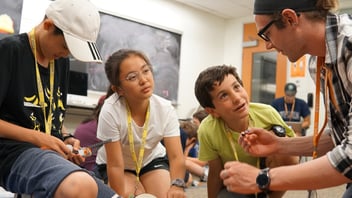It's About Exploration, Not Passion

From the New York Times parenting blog “Motherlode” comes a fresh take on the role of passion in the lives of children. Writer Lisa Heffernan pens “Our Push for Passion and Why It Harms Kids.” Heffernan worries that we are taking passion too far, and as we spend countless hours and dollars helping our child pursue a singular interest that may in fact be passing, we may inadvertently cause them miss other opportunities, talents, and pursuits.
Heffernan’s blog post argues for exploration—trying new things, and discovering lots of interests and talents along the way—instead of a singular dedication to a passion at a young age. She examines our parental (and societal) preoccupation with helping kids find their passions at a young age. Parents find themselves clinging to a child’s passing interest, throwing whatever resources are available at it in the hopes of cultivating a passion, thus defining an identity for the child that can be readily expressed in a college admission essay or interview.
Applying to College: Finding the Right Approach
We come by this passion pursuit with the support of the college process as well as our school and social communities, where the pressure is on to have our children stand out from the rest, ideally by displaying a unique talent and an unyielding drive toward mastery. And our children feel this pressure as well. So whether that passion is baseball, the French horn, rhythmic gymnastics, or astronomy, we feel that we are supporting our children’s very futures by committing heaps of family resources (time, money, energy) to its quest.
But Heffernan wonders if we are in fact doing a disservice to our children with this pigeonholed approach. Are we leading our children down a path that is too narrow with the mistaken idea that it will lead not just to a golden ticket to a top-tier college, but also to happiness and fulfillment in life itself? Heffernan encourages a broader approach for our children, one of exploration—of interests, talents, and the world around them—as they discover what types of things light them up inside. Focusing too early on one or two “passions” may prevent them from discovering true interests and talents.
Further, maintaining an open approach of exploration provides parents with a greater opportunity to help children develop important life skills like problem-solving, resilience, persistence, and grit. When armed with these skills and a habit of exploration, our children are much more likely to have fulfilling, happy lives, filled with interests and enthusiasms.
To fully understand Lisa Heffernan's viewpoint, be sure to read her blog post.



